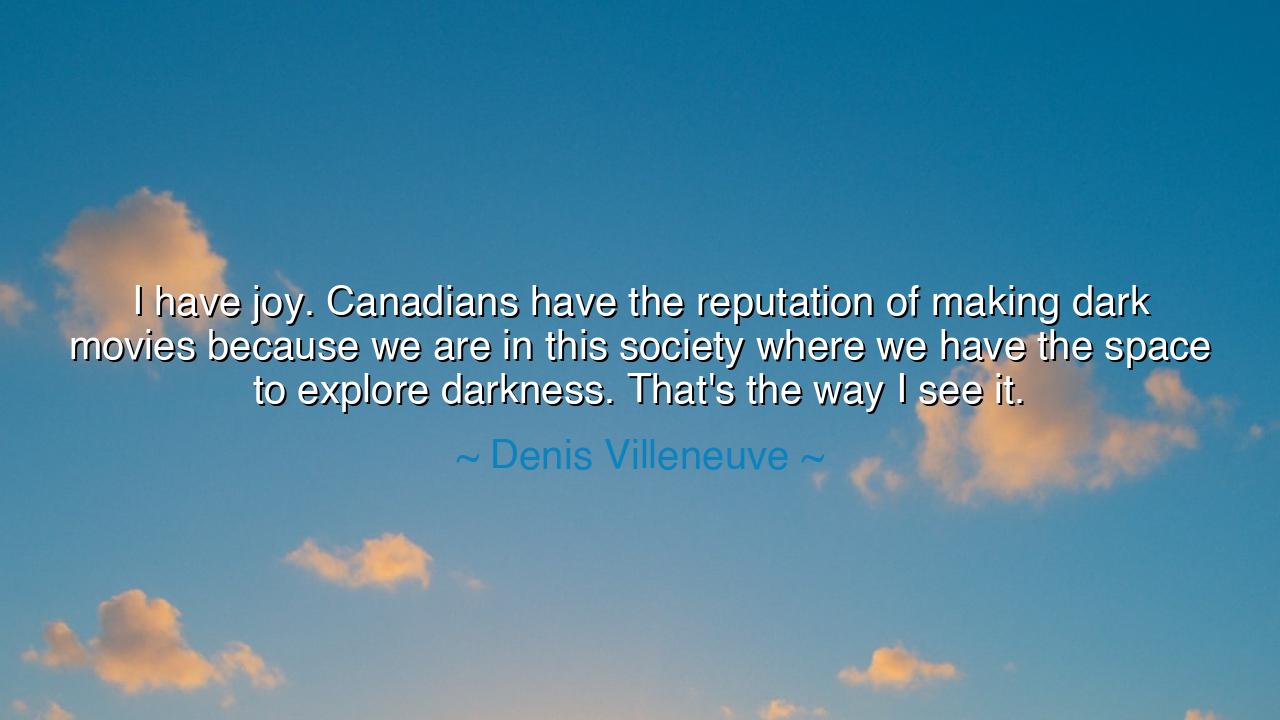
I have joy. Canadians have the reputation of making dark movies
I have joy. Canadians have the reputation of making dark movies because we are in this society where we have the space to explore darkness. That's the way I see it.






Hear the voice of Denis Villeneuve, the Canadian storyteller whose visions have carried audiences into realms both tender and terrifying: “I have joy. Canadians have the reputation of making dark movies because we are in this society where we have the space to explore darkness. That’s the way I see it.” In these words, he reveals a paradox: that joy and darkness are not enemies, but companions; that the ability to explore the shadows of human life is itself a gift born of freedom and security. His statement reminds us that to truly embrace joy, one must also dare to confront sorrow.
The origin of this quote arises from Villeneuve’s reflections on cinema and his homeland. Canada, known for its quiet vastness, its seasons of silence, and its cultural distance from the noisy centers of empire, offers its artists something rare: space—both literal and spiritual. In such a place, creators need not rush to flatter the crowd or to appease the market. They may descend into the depths of the human psyche, into grief, loneliness, violence, or despair. Out of this exploration, they may craft art that is called “dark.” Yet Villeneuve insists that beneath it, there is joy—the joy of honesty, of discovery, of telling the truth about life’s shadows.
This teaching recalls the wisdom of the ancients, who knew that light and darkness are woven together. The Greek tragedians did not shy away from sorrow but placed it upon the stage, that the audience might learn catharsis, the purging of the soul through tears. Their plays were dark, yet they were written not in despair, but in reverence for truth. Likewise, Villeneuve speaks of darkness not as corruption, but as a mirror that reveals what lies beneath the surface. To look upon it is painful, but also necessary, for through it one comes closer to understanding what it means to be human.
History too gives us examples. In post-war Japan, filmmakers such as Akira Kurosawa depicted devastation, loss, and the fragility of life in the aftermath of ruin. Yet within these stories there was a longing for redemption, for dignity, for resilience. They were dark films, born of suffering, yet they held a light that endured. Villeneuve’s insight stands in this same lineage: that societies able to face their darkness without flinching are the ones that also preserve their capacity for hope and joy.
The emotional power of his words rests in the phrase: “I have joy.” It is as if he stands as a witness to the truth that exploring darkness does not destroy the soul but strengthens it. To speak of violence, grief, or despair in art is not to celebrate them, but to give them voice so they may no longer fester in silence. True joy is not fragile cheerfulness; it is the resilient light that endures even after walking through the night. Villeneuve shows us that the artist who dares to explore shadows may emerge with a clearer vision of the dawn.
The lesson for us is profound: do not fear the dark passages of life. Do not hide from pain, loss, or sorrow. To look away is to remain shallow, but to face them is to grow deep. Just as Villeneuve and his fellow Canadian filmmakers use their cultural space to explore the depths of the human condition, so too can each of us use our own moments of struggle to seek truth. In this way, we transform darkness into understanding, and understanding into strength.
And what actions, then, must we take? When hardship arises, do not rush to cover it with distractions or false cheer. Sit with it. Explore it. Learn what it has to teach. If you create, let your art carry both the light and the shadow, for both are part of the human song. And always remember Villeneuve’s wisdom: the exploration of darkness is not the loss of joy, but its foundation. For joy that has looked into the abyss and endured is joy unshakable, joy eternal.






AAdministratorAdministrator
Welcome, honored guests. Please leave a comment, we will respond soon